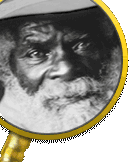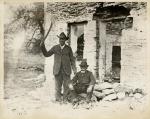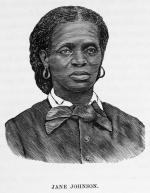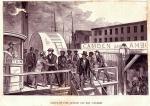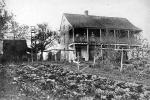Chapter Four: Coming of War
It was near the end of the summer in 1851 when Edward Gorsuch, a Maryland slaveholder, received a letter from Lancaster County, Pennsylvania. The contents of the letter would end his life and help spark the Civil War.
The note provided information on the location of four runaway slaves who had escaped from his plantation in rural Baltimore County nearly two years before. "Now, the best way," advised the correspondent, "is for you to come as a hunter, disguised."
On the surface, it seemed like strange advice, because Congress had recently passed a new, tougher Fugitive Slave Act. The federal law was supposed to guarantee that southern slave owners would receive the full assistance of northern courts and citizens if they ever had to retrieve fugitives in free states.
But the law was unpopular in parts of the North. In states like Pennsylvania, with a large population of black residents, there was even talk of violent resistance. Southern Lancaster County, in particular, had become an explosive place. Gangs of young white men prowled black neighborhoods looking to kidnap for hire. Local blacks responded by organizing in self-defense.
Gorsuch rode the train to Philadelphia in early September, got a federal warrant, and proceeded to Lancaster to recapture his property. But if he had his informants, so did his former slaves, who were warned in advance that their master was coming.
What happened next is the stuff of legend as much as history. Gorsuch and a small party of slave catchers went to the town of Christiana at the southern edge of Lancaster County. There, they confronted William Parker, a local African American who was helping to protect the runaways. "If you take another step," Parker reportedly said, "I'll break your neck." Black residents, and a handful of white neighbors, stood by him, armed and angry. But the slave owner refused to yield. "I will have my property," he responded, "or die in the attempt."
The Christiana Riot, as it was called, immediately followed. The two sides exchanged gun fire on that morning, September 11, 1851. The event left Gorsuch dead, his son severely wounded, and a nation wrenched further apart by the evils of slavery. The government arrested 38 men and charged them with treason. William Parker and the four runaways escaped. Two months later, a Philadelphia jury acquitted the first defendant, a white man named Castner Hanway, in less than fifteen minutes. The rest were released on bail and were never convicted in court.
Christiana Riot, as it was called, immediately followed. The two sides exchanged gun fire on that morning, September 11, 1851. The event left Gorsuch dead, his son severely wounded, and a nation wrenched further apart by the evils of slavery. The government arrested 38 men and charged them with treason. William Parker and the four runaways escaped. Two months later, a Philadelphia jury acquitted the first defendant, a white man named Castner Hanway, in less than fifteen minutes. The rest were released on bail and were never convicted in court.
The Fugitive Slave Law was part of the Compromise of 1850, a national arrangement on slavery that was supposed to have been the "final settlement" of sectional differences. Instead, the divisions now grew much worse. A Lancaster newspaper speculated that Christiana was "The First Blow Struck" in an impending "Civil War." More blows would follow, some of them again delivered in the state of Pennsylvania, including Philadelphia abolitionists harboring of Jane Johnson and her sons, when she fled from her owner—the newly appointed American minister to Nicaragua—in the summer of 1855.
Jane Johnson and her sons, when she fled from her owner—the newly appointed American minister to Nicaragua—in the summer of 1855.
One man who welcomed the growing conflict was John Brown, a former Pennsylvania resident who was living in Springfield, Massachusetts. He wanted to form a national league of armed abolitionists to resist the slave catchers. Brown had always been ambitious. He had natural charisma, a power over people, that was evident when he ran his tannery in New Richmond, Pennsylvania during the 1820s and 1830s. But with big dreams came big failures, and Brown had spent most of his adult life struggling with disappointment.
tannery in New Richmond, Pennsylvania during the 1820s and 1830s. But with big dreams came big failures, and Brown had spent most of his adult life struggling with disappointment.
By the 1850s, he found what he believed was his divine calling: to strike a violent blow against slavery. "Talk! Talk! Talk!" he cried impatiently, "That will never free the slaves." He first took action in Kansas, where abolitionists and slaveholders engaged in a bloody struggle to determine whether the territory would enter the Union as a free or slave state. Brown was responsible for several deaths, some notoriously cruel.
Still, he saw a need for more violence, convinced that "the crimes of this guilty land will never be purged away; but with Blood." He made some excursions into Missouri but ultimately returned to Pennsylvania. In Pennsylvania, John Brown secretly plotted to launch a full-scale war against slavery. During the summer of 1859, he lived in Chambersburg, gathering his followers and purchasing menacing weapons, including a set of pikes. His first target was a federal arsenal, where ammunition and weapons were stored, at nearby Harpers Ferry, Virginia.
John Brown secretly plotted to launch a full-scale war against slavery. During the summer of 1859, he lived in Chambersburg, gathering his followers and purchasing menacing weapons, including a set of pikes. His first target was a federal arsenal, where ammunition and weapons were stored, at nearby Harpers Ferry, Virginia.
Brown met with Frederick Douglass, an important black abolitionist, hoping to gain his support. "When I strike, the bees will begin to swarm," he told Douglass, "and I shall want you to help hive them." Douglass believed that the plan was suicidal and declined to join.
Frederick Douglass, an important black abolitionist, hoping to gain his support. "When I strike, the bees will begin to swarm," he told Douglass, "and I shall want you to help hive them." Douglass believed that the plan was suicidal and declined to join.
Undaunted, Brown went ahead with his raid on October 16, 1859. It was a doomed mission. Brown's war for the liberation of slaves lasted about 36 hours before federal authorities stormed the arsenal and placed him in a Virginia jail. But the abolitionist warrior achieved almost everything else he had ever desired. His name was now known everywhere and talk over slavery was finally giving way to violence. One man had died at Christiana. Seventeen lost their lives at Harpers Ferry. Over 620,000 would fall during the Civil War. It was a terrible price to pay, but one that ultimately bought freedom for African Americans and the beginnings of a more equal society.
raid on October 16, 1859. It was a doomed mission. Brown's war for the liberation of slaves lasted about 36 hours before federal authorities stormed the arsenal and placed him in a Virginia jail. But the abolitionist warrior achieved almost everything else he had ever desired. His name was now known everywhere and talk over slavery was finally giving way to violence. One man had died at Christiana. Seventeen lost their lives at Harpers Ferry. Over 620,000 would fall during the Civil War. It was a terrible price to pay, but one that ultimately bought freedom for African Americans and the beginnings of a more equal society.
The note provided information on the location of four runaway slaves who had escaped from his plantation in rural Baltimore County nearly two years before. "Now, the best way," advised the correspondent, "is for you to come as a hunter, disguised."
On the surface, it seemed like strange advice, because Congress had recently passed a new, tougher Fugitive Slave Act. The federal law was supposed to guarantee that southern slave owners would receive the full assistance of northern courts and citizens if they ever had to retrieve fugitives in free states.
But the law was unpopular in parts of the North. In states like Pennsylvania, with a large population of black residents, there was even talk of violent resistance. Southern Lancaster County, in particular, had become an explosive place. Gangs of young white men prowled black neighborhoods looking to kidnap for hire. Local blacks responded by organizing in self-defense.
Gorsuch rode the train to Philadelphia in early September, got a federal warrant, and proceeded to Lancaster to recapture his property. But if he had his informants, so did his former slaves, who were warned in advance that their master was coming.
What happened next is the stuff of legend as much as history. Gorsuch and a small party of slave catchers went to the town of Christiana at the southern edge of Lancaster County. There, they confronted William Parker, a local African American who was helping to protect the runaways. "If you take another step," Parker reportedly said, "I'll break your neck." Black residents, and a handful of white neighbors, stood by him, armed and angry. But the slave owner refused to yield. "I will have my property," he responded, "or die in the attempt."
The
The Fugitive Slave Law was part of the Compromise of 1850, a national arrangement on slavery that was supposed to have been the "final settlement" of sectional differences. Instead, the divisions now grew much worse. A Lancaster newspaper speculated that Christiana was "The First Blow Struck" in an impending "Civil War." More blows would follow, some of them again delivered in the state of Pennsylvania, including Philadelphia abolitionists harboring of
One man who welcomed the growing conflict was John Brown, a former Pennsylvania resident who was living in Springfield, Massachusetts. He wanted to form a national league of armed abolitionists to resist the slave catchers. Brown had always been ambitious. He had natural charisma, a power over people, that was evident when he ran his
By the 1850s, he found what he believed was his divine calling: to strike a violent blow against slavery. "Talk! Talk! Talk!" he cried impatiently, "That will never free the slaves." He first took action in Kansas, where abolitionists and slaveholders engaged in a bloody struggle to determine whether the territory would enter the Union as a free or slave state. Brown was responsible for several deaths, some notoriously cruel.
Still, he saw a need for more violence, convinced that "the crimes of this guilty land will never be purged away; but with Blood." He made some excursions into Missouri but ultimately returned to Pennsylvania. In Pennsylvania,
Brown met with
Undaunted, Brown went ahead with his


